Compare and Contrast: Organizational Behavior Personality Theories
VerifiedAdded on 2023/06/04
|6
|2028
|224
Essay
AI Summary
This essay delves into the realm of organizational behavior by comparing and contrasting various theoretical arguments on personality. It begins by defining personality and highlighting the Big Five personality theory. The essay then explores the theories of Freud, Eysenck, and Skinner, contrasting their views on personality development and its components. A key focus is on the implications of personality differences for organizations, discussing how individual traits influence job satisfaction, employee behavior, and overall organizational success. Real-world examples, such as the hospitality industry and the leadership style of Mark Zuckerberg, are used to illustrate these points. The essay concludes by emphasizing the critical role of personality in shaping individual and organizational outcomes.
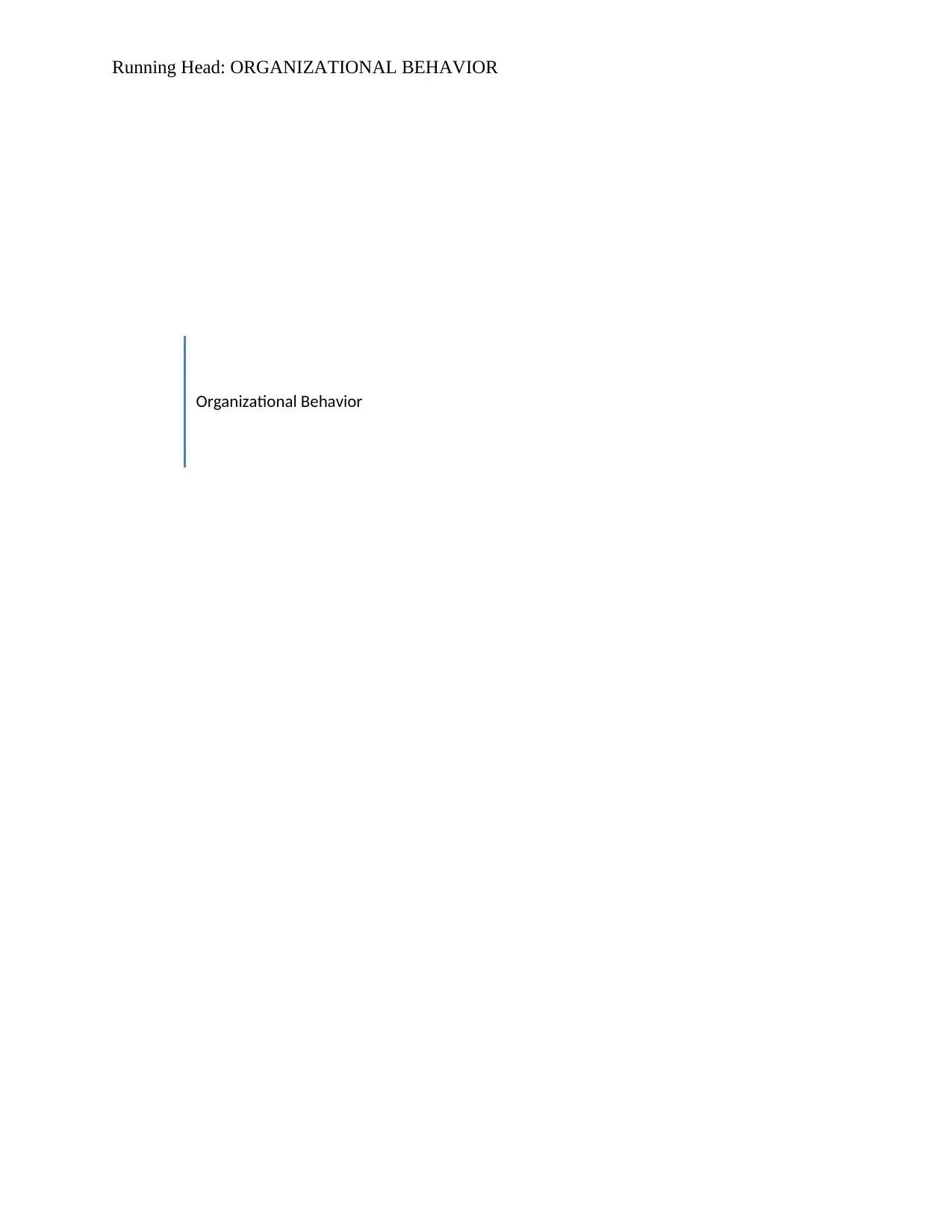
Running Head: ORGANIZATIONAL BEHAVIOR
Organizational Behavior
Organizational Behavior
Paraphrase This Document
Need a fresh take? Get an instant paraphrase of this document with our AI Paraphraser
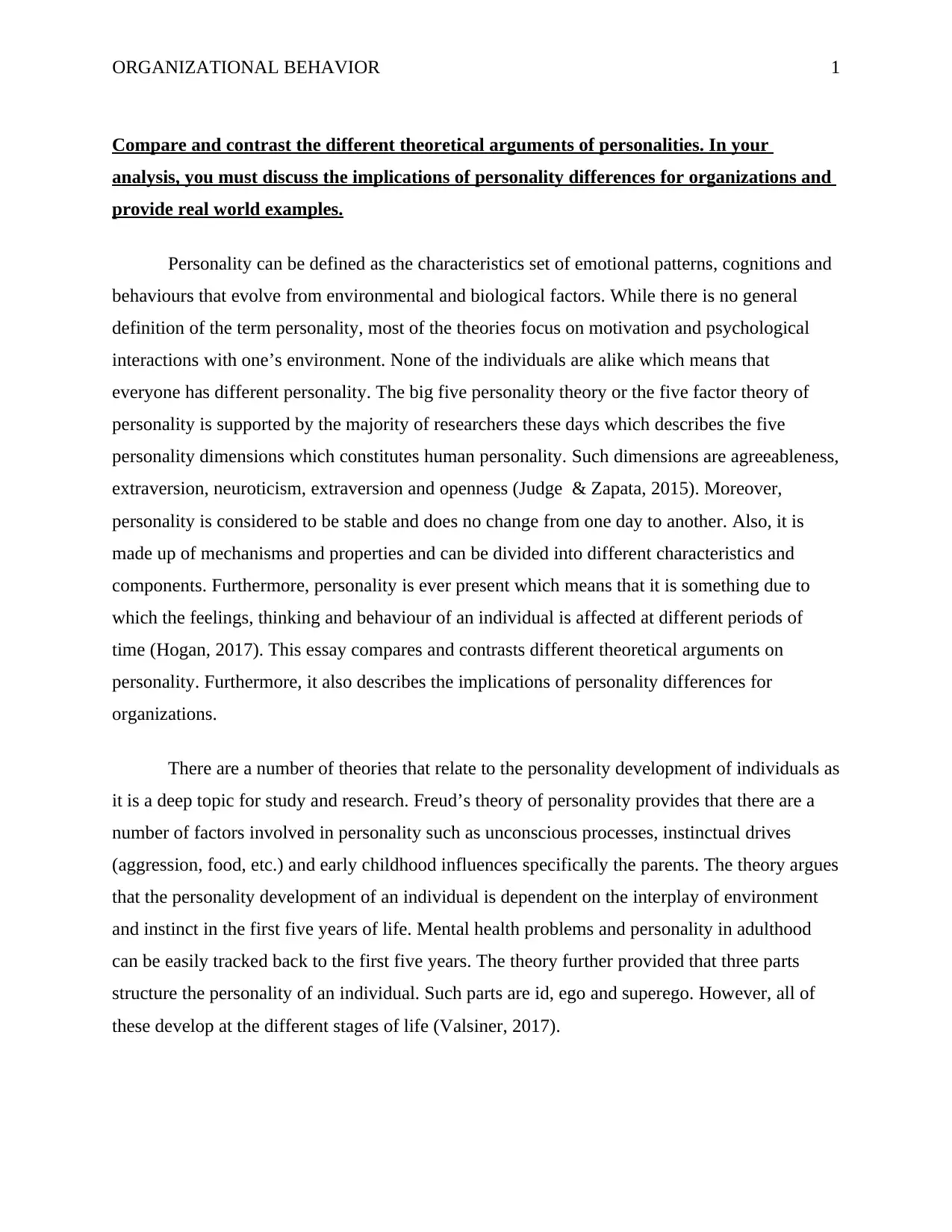
ORGANIZATIONAL BEHAVIOR 1
Compare and contrast the different theoretical arguments of personalities. In your
analysis, you must discuss the implications of personality differences for organizations and
provide real world examples.
Personality can be defined as the characteristics set of emotional patterns, cognitions and
behaviours that evolve from environmental and biological factors. While there is no general
definition of the term personality, most of the theories focus on motivation and psychological
interactions with one’s environment. None of the individuals are alike which means that
everyone has different personality. The big five personality theory or the five factor theory of
personality is supported by the majority of researchers these days which describes the five
personality dimensions which constitutes human personality. Such dimensions are agreeableness,
extraversion, neuroticism, extraversion and openness (Judge & Zapata, 2015). Moreover,
personality is considered to be stable and does no change from one day to another. Also, it is
made up of mechanisms and properties and can be divided into different characteristics and
components. Furthermore, personality is ever present which means that it is something due to
which the feelings, thinking and behaviour of an individual is affected at different periods of
time (Hogan, 2017). This essay compares and contrasts different theoretical arguments on
personality. Furthermore, it also describes the implications of personality differences for
organizations.
There are a number of theories that relate to the personality development of individuals as
it is a deep topic for study and research. Freud’s theory of personality provides that there are a
number of factors involved in personality such as unconscious processes, instinctual drives
(aggression, food, etc.) and early childhood influences specifically the parents. The theory argues
that the personality development of an individual is dependent on the interplay of environment
and instinct in the first five years of life. Mental health problems and personality in adulthood
can be easily tracked back to the first five years. The theory further provided that three parts
structure the personality of an individual. Such parts are id, ego and superego. However, all of
these develop at the different stages of life (Valsiner, 2017).
Compare and contrast the different theoretical arguments of personalities. In your
analysis, you must discuss the implications of personality differences for organizations and
provide real world examples.
Personality can be defined as the characteristics set of emotional patterns, cognitions and
behaviours that evolve from environmental and biological factors. While there is no general
definition of the term personality, most of the theories focus on motivation and psychological
interactions with one’s environment. None of the individuals are alike which means that
everyone has different personality. The big five personality theory or the five factor theory of
personality is supported by the majority of researchers these days which describes the five
personality dimensions which constitutes human personality. Such dimensions are agreeableness,
extraversion, neuroticism, extraversion and openness (Judge & Zapata, 2015). Moreover,
personality is considered to be stable and does no change from one day to another. Also, it is
made up of mechanisms and properties and can be divided into different characteristics and
components. Furthermore, personality is ever present which means that it is something due to
which the feelings, thinking and behaviour of an individual is affected at different periods of
time (Hogan, 2017). This essay compares and contrasts different theoretical arguments on
personality. Furthermore, it also describes the implications of personality differences for
organizations.
There are a number of theories that relate to the personality development of individuals as
it is a deep topic for study and research. Freud’s theory of personality provides that there are a
number of factors involved in personality such as unconscious processes, instinctual drives
(aggression, food, etc.) and early childhood influences specifically the parents. The theory argues
that the personality development of an individual is dependent on the interplay of environment
and instinct in the first five years of life. Mental health problems and personality in adulthood
can be easily tracked back to the first five years. The theory further provided that three parts
structure the personality of an individual. Such parts are id, ego and superego. However, all of
these develop at the different stages of life (Valsiner, 2017).
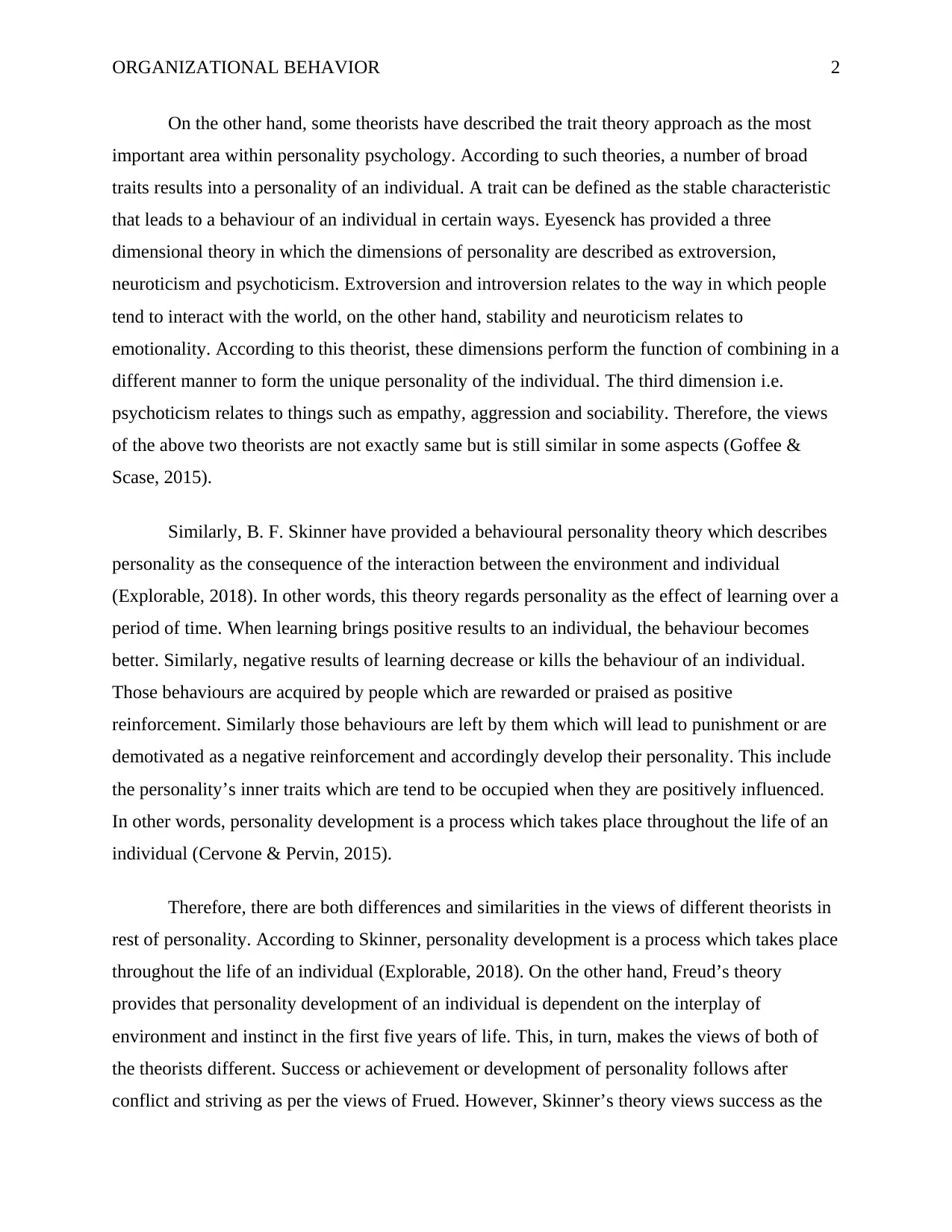
ORGANIZATIONAL BEHAVIOR 2
On the other hand, some theorists have described the trait theory approach as the most
important area within personality psychology. According to such theories, a number of broad
traits results into a personality of an individual. A trait can be defined as the stable characteristic
that leads to a behaviour of an individual in certain ways. Eyesenck has provided a three
dimensional theory in which the dimensions of personality are described as extroversion,
neuroticism and psychoticism. Extroversion and introversion relates to the way in which people
tend to interact with the world, on the other hand, stability and neuroticism relates to
emotionality. According to this theorist, these dimensions perform the function of combining in a
different manner to form the unique personality of the individual. The third dimension i.e.
psychoticism relates to things such as empathy, aggression and sociability. Therefore, the views
of the above two theorists are not exactly same but is still similar in some aspects (Goffee &
Scase, 2015).
Similarly, B. F. Skinner have provided a behavioural personality theory which describes
personality as the consequence of the interaction between the environment and individual
(Explorable, 2018). In other words, this theory regards personality as the effect of learning over a
period of time. When learning brings positive results to an individual, the behaviour becomes
better. Similarly, negative results of learning decrease or kills the behaviour of an individual.
Those behaviours are acquired by people which are rewarded or praised as positive
reinforcement. Similarly those behaviours are left by them which will lead to punishment or are
demotivated as a negative reinforcement and accordingly develop their personality. This include
the personality’s inner traits which are tend to be occupied when they are positively influenced.
In other words, personality development is a process which takes place throughout the life of an
individual (Cervone & Pervin, 2015).
Therefore, there are both differences and similarities in the views of different theorists in
rest of personality. According to Skinner, personality development is a process which takes place
throughout the life of an individual (Explorable, 2018). On the other hand, Freud’s theory
provides that personality development of an individual is dependent on the interplay of
environment and instinct in the first five years of life. This, in turn, makes the views of both of
the theorists different. Success or achievement or development of personality follows after
conflict and striving as per the views of Frued. However, Skinner’s theory views success as the
On the other hand, some theorists have described the trait theory approach as the most
important area within personality psychology. According to such theories, a number of broad
traits results into a personality of an individual. A trait can be defined as the stable characteristic
that leads to a behaviour of an individual in certain ways. Eyesenck has provided a three
dimensional theory in which the dimensions of personality are described as extroversion,
neuroticism and psychoticism. Extroversion and introversion relates to the way in which people
tend to interact with the world, on the other hand, stability and neuroticism relates to
emotionality. According to this theorist, these dimensions perform the function of combining in a
different manner to form the unique personality of the individual. The third dimension i.e.
psychoticism relates to things such as empathy, aggression and sociability. Therefore, the views
of the above two theorists are not exactly same but is still similar in some aspects (Goffee &
Scase, 2015).
Similarly, B. F. Skinner have provided a behavioural personality theory which describes
personality as the consequence of the interaction between the environment and individual
(Explorable, 2018). In other words, this theory regards personality as the effect of learning over a
period of time. When learning brings positive results to an individual, the behaviour becomes
better. Similarly, negative results of learning decrease or kills the behaviour of an individual.
Those behaviours are acquired by people which are rewarded or praised as positive
reinforcement. Similarly those behaviours are left by them which will lead to punishment or are
demotivated as a negative reinforcement and accordingly develop their personality. This include
the personality’s inner traits which are tend to be occupied when they are positively influenced.
In other words, personality development is a process which takes place throughout the life of an
individual (Cervone & Pervin, 2015).
Therefore, there are both differences and similarities in the views of different theorists in
rest of personality. According to Skinner, personality development is a process which takes place
throughout the life of an individual (Explorable, 2018). On the other hand, Freud’s theory
provides that personality development of an individual is dependent on the interplay of
environment and instinct in the first five years of life. This, in turn, makes the views of both of
the theorists different. Success or achievement or development of personality follows after
conflict and striving as per the views of Frued. However, Skinner’s theory views success as the
⊘ This is a preview!⊘
Do you want full access?
Subscribe today to unlock all pages.

Trusted by 1+ million students worldwide
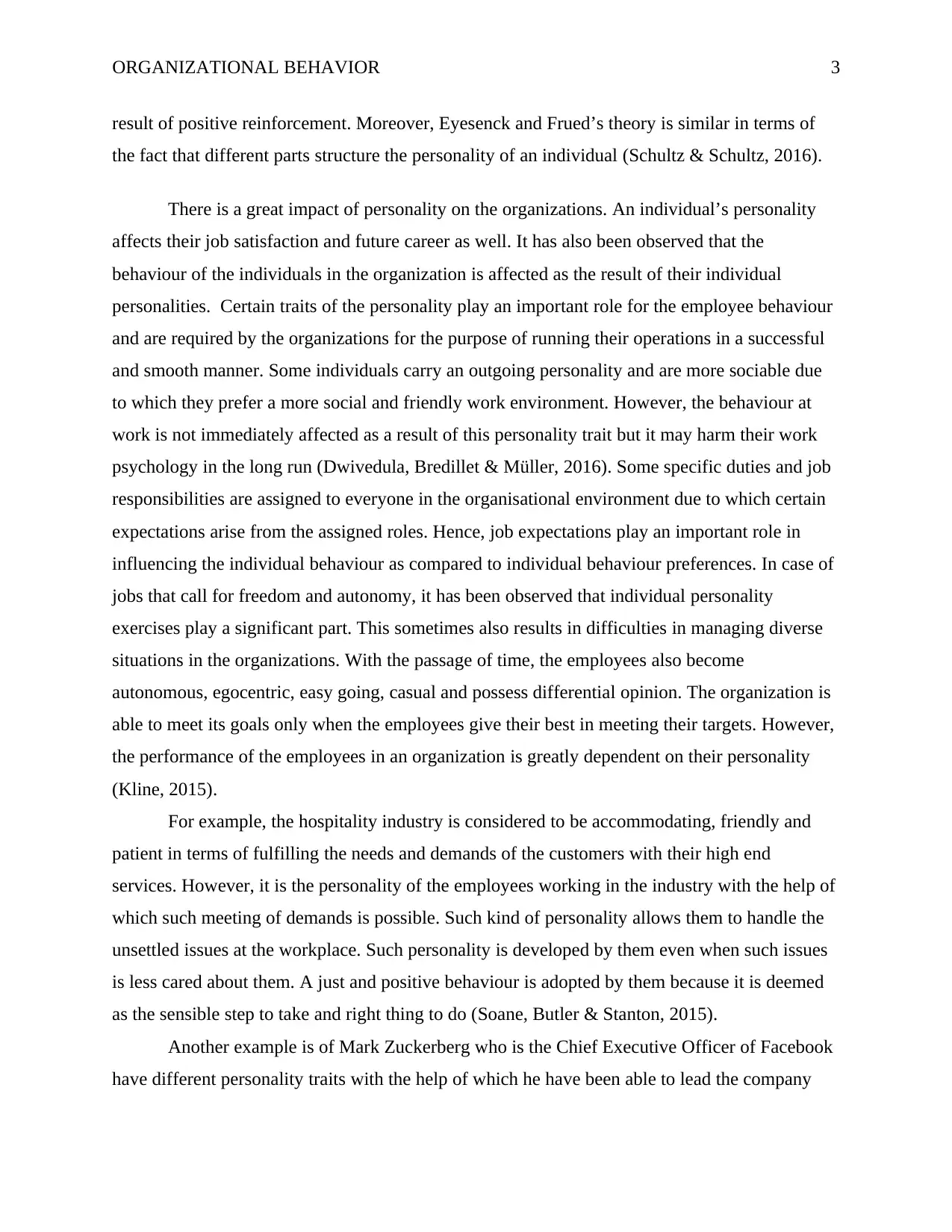
ORGANIZATIONAL BEHAVIOR 3
result of positive reinforcement. Moreover, Eyesenck and Frued’s theory is similar in terms of
the fact that different parts structure the personality of an individual (Schultz & Schultz, 2016).
There is a great impact of personality on the organizations. An individual’s personality
affects their job satisfaction and future career as well. It has also been observed that the
behaviour of the individuals in the organization is affected as the result of their individual
personalities. Certain traits of the personality play an important role for the employee behaviour
and are required by the organizations for the purpose of running their operations in a successful
and smooth manner. Some individuals carry an outgoing personality and are more sociable due
to which they prefer a more social and friendly work environment. However, the behaviour at
work is not immediately affected as a result of this personality trait but it may harm their work
psychology in the long run (Dwivedula, Bredillet & Müller, 2016). Some specific duties and job
responsibilities are assigned to everyone in the organisational environment due to which certain
expectations arise from the assigned roles. Hence, job expectations play an important role in
influencing the individual behaviour as compared to individual behaviour preferences. In case of
jobs that call for freedom and autonomy, it has been observed that individual personality
exercises play a significant part. This sometimes also results in difficulties in managing diverse
situations in the organizations. With the passage of time, the employees also become
autonomous, egocentric, easy going, casual and possess differential opinion. The organization is
able to meet its goals only when the employees give their best in meeting their targets. However,
the performance of the employees in an organization is greatly dependent on their personality
(Kline, 2015).
For example, the hospitality industry is considered to be accommodating, friendly and
patient in terms of fulfilling the needs and demands of the customers with their high end
services. However, it is the personality of the employees working in the industry with the help of
which such meeting of demands is possible. Such kind of personality allows them to handle the
unsettled issues at the workplace. Such personality is developed by them even when such issues
is less cared about them. A just and positive behaviour is adopted by them because it is deemed
as the sensible step to take and right thing to do (Soane, Butler & Stanton, 2015).
Another example is of Mark Zuckerberg who is the Chief Executive Officer of Facebook
have different personality traits with the help of which he have been able to lead the company
result of positive reinforcement. Moreover, Eyesenck and Frued’s theory is similar in terms of
the fact that different parts structure the personality of an individual (Schultz & Schultz, 2016).
There is a great impact of personality on the organizations. An individual’s personality
affects their job satisfaction and future career as well. It has also been observed that the
behaviour of the individuals in the organization is affected as the result of their individual
personalities. Certain traits of the personality play an important role for the employee behaviour
and are required by the organizations for the purpose of running their operations in a successful
and smooth manner. Some individuals carry an outgoing personality and are more sociable due
to which they prefer a more social and friendly work environment. However, the behaviour at
work is not immediately affected as a result of this personality trait but it may harm their work
psychology in the long run (Dwivedula, Bredillet & Müller, 2016). Some specific duties and job
responsibilities are assigned to everyone in the organisational environment due to which certain
expectations arise from the assigned roles. Hence, job expectations play an important role in
influencing the individual behaviour as compared to individual behaviour preferences. In case of
jobs that call for freedom and autonomy, it has been observed that individual personality
exercises play a significant part. This sometimes also results in difficulties in managing diverse
situations in the organizations. With the passage of time, the employees also become
autonomous, egocentric, easy going, casual and possess differential opinion. The organization is
able to meet its goals only when the employees give their best in meeting their targets. However,
the performance of the employees in an organization is greatly dependent on their personality
(Kline, 2015).
For example, the hospitality industry is considered to be accommodating, friendly and
patient in terms of fulfilling the needs and demands of the customers with their high end
services. However, it is the personality of the employees working in the industry with the help of
which such meeting of demands is possible. Such kind of personality allows them to handle the
unsettled issues at the workplace. Such personality is developed by them even when such issues
is less cared about them. A just and positive behaviour is adopted by them because it is deemed
as the sensible step to take and right thing to do (Soane, Butler & Stanton, 2015).
Another example is of Mark Zuckerberg who is the Chief Executive Officer of Facebook
have different personality traits with the help of which he have been able to lead the company
Paraphrase This Document
Need a fresh take? Get an instant paraphrase of this document with our AI Paraphraser
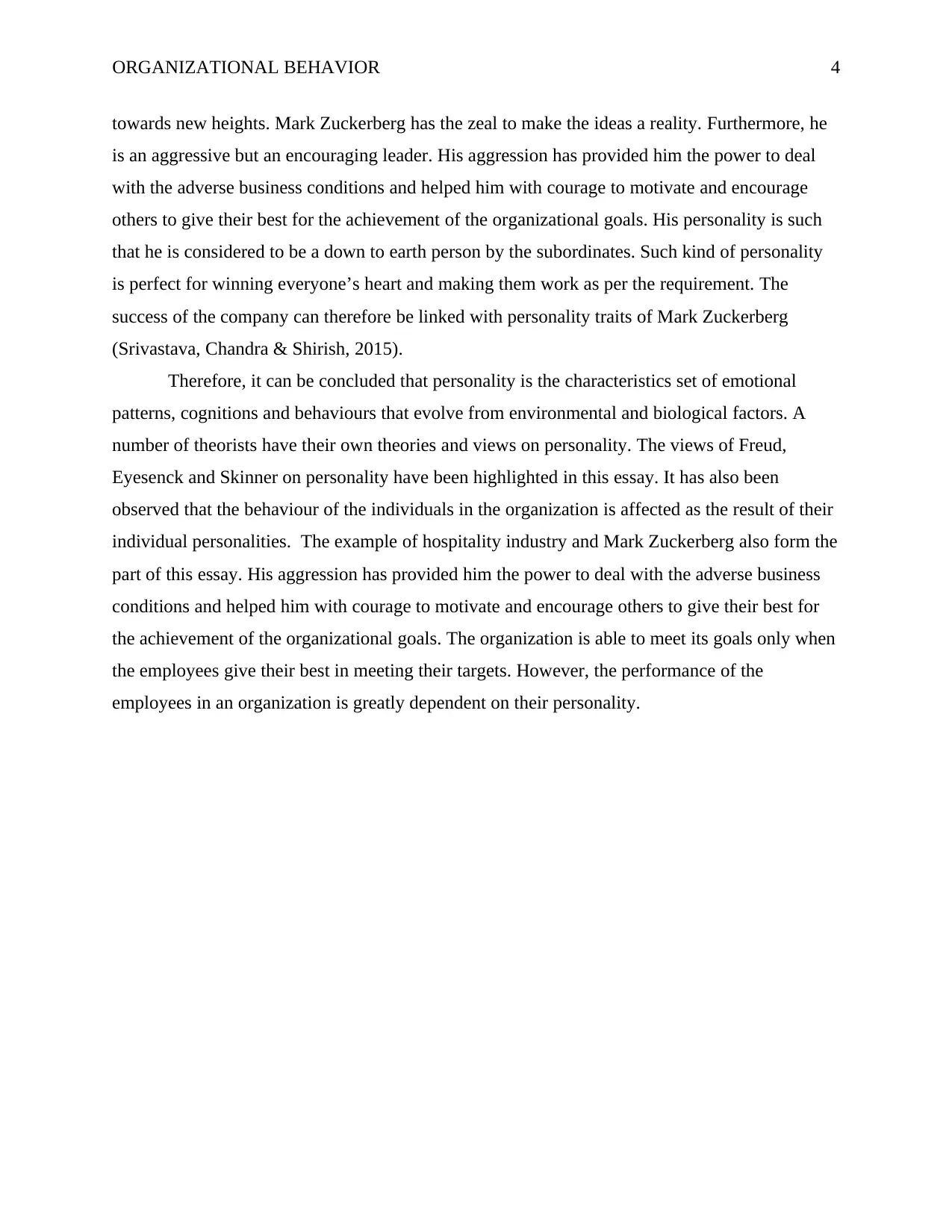
ORGANIZATIONAL BEHAVIOR 4
towards new heights. Mark Zuckerberg has the zeal to make the ideas a reality. Furthermore, he
is an aggressive but an encouraging leader. His aggression has provided him the power to deal
with the adverse business conditions and helped him with courage to motivate and encourage
others to give their best for the achievement of the organizational goals. His personality is such
that he is considered to be a down to earth person by the subordinates. Such kind of personality
is perfect for winning everyone’s heart and making them work as per the requirement. The
success of the company can therefore be linked with personality traits of Mark Zuckerberg
(Srivastava, Chandra & Shirish, 2015).
Therefore, it can be concluded that personality is the characteristics set of emotional
patterns, cognitions and behaviours that evolve from environmental and biological factors. A
number of theorists have their own theories and views on personality. The views of Freud,
Eyesenck and Skinner on personality have been highlighted in this essay. It has also been
observed that the behaviour of the individuals in the organization is affected as the result of their
individual personalities. The example of hospitality industry and Mark Zuckerberg also form the
part of this essay. His aggression has provided him the power to deal with the adverse business
conditions and helped him with courage to motivate and encourage others to give their best for
the achievement of the organizational goals. The organization is able to meet its goals only when
the employees give their best in meeting their targets. However, the performance of the
employees in an organization is greatly dependent on their personality.
towards new heights. Mark Zuckerberg has the zeal to make the ideas a reality. Furthermore, he
is an aggressive but an encouraging leader. His aggression has provided him the power to deal
with the adverse business conditions and helped him with courage to motivate and encourage
others to give their best for the achievement of the organizational goals. His personality is such
that he is considered to be a down to earth person by the subordinates. Such kind of personality
is perfect for winning everyone’s heart and making them work as per the requirement. The
success of the company can therefore be linked with personality traits of Mark Zuckerberg
(Srivastava, Chandra & Shirish, 2015).
Therefore, it can be concluded that personality is the characteristics set of emotional
patterns, cognitions and behaviours that evolve from environmental and biological factors. A
number of theorists have their own theories and views on personality. The views of Freud,
Eyesenck and Skinner on personality have been highlighted in this essay. It has also been
observed that the behaviour of the individuals in the organization is affected as the result of their
individual personalities. The example of hospitality industry and Mark Zuckerberg also form the
part of this essay. His aggression has provided him the power to deal with the adverse business
conditions and helped him with courage to motivate and encourage others to give their best for
the achievement of the organizational goals. The organization is able to meet its goals only when
the employees give their best in meeting their targets. However, the performance of the
employees in an organization is greatly dependent on their personality.
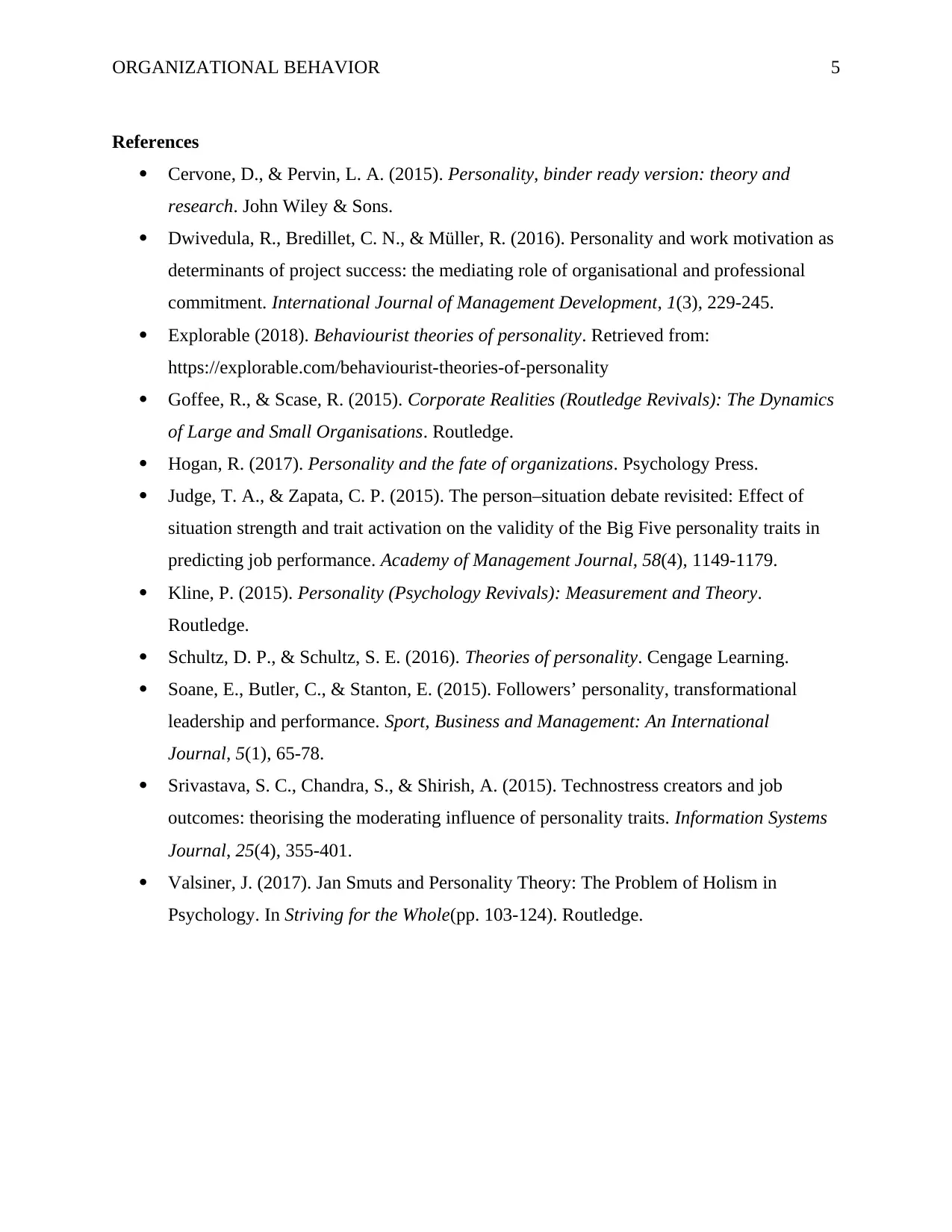
ORGANIZATIONAL BEHAVIOR 5
References
Cervone, D., & Pervin, L. A. (2015). Personality, binder ready version: theory and
research. John Wiley & Sons.
Dwivedula, R., Bredillet, C. N., & Müller, R. (2016). Personality and work motivation as
determinants of project success: the mediating role of organisational and professional
commitment. International Journal of Management Development, 1(3), 229-245.
Explorable (2018). Behaviourist theories of personality. Retrieved from:
https://explorable.com/behaviourist-theories-of-personality
Goffee, R., & Scase, R. (2015). Corporate Realities (Routledge Revivals): The Dynamics
of Large and Small Organisations. Routledge.
Hogan, R. (2017). Personality and the fate of organizations. Psychology Press.
Judge, T. A., & Zapata, C. P. (2015). The person–situation debate revisited: Effect of
situation strength and trait activation on the validity of the Big Five personality traits in
predicting job performance. Academy of Management Journal, 58(4), 1149-1179.
Kline, P. (2015). Personality (Psychology Revivals): Measurement and Theory.
Routledge.
Schultz, D. P., & Schultz, S. E. (2016). Theories of personality. Cengage Learning.
Soane, E., Butler, C., & Stanton, E. (2015). Followers’ personality, transformational
leadership and performance. Sport, Business and Management: An International
Journal, 5(1), 65-78.
Srivastava, S. C., Chandra, S., & Shirish, A. (2015). Technostress creators and job
outcomes: theorising the moderating influence of personality traits. Information Systems
Journal, 25(4), 355-401.
Valsiner, J. (2017). Jan Smuts and Personality Theory: The Problem of Holism in
Psychology. In Striving for the Whole(pp. 103-124). Routledge.
References
Cervone, D., & Pervin, L. A. (2015). Personality, binder ready version: theory and
research. John Wiley & Sons.
Dwivedula, R., Bredillet, C. N., & Müller, R. (2016). Personality and work motivation as
determinants of project success: the mediating role of organisational and professional
commitment. International Journal of Management Development, 1(3), 229-245.
Explorable (2018). Behaviourist theories of personality. Retrieved from:
https://explorable.com/behaviourist-theories-of-personality
Goffee, R., & Scase, R. (2015). Corporate Realities (Routledge Revivals): The Dynamics
of Large and Small Organisations. Routledge.
Hogan, R. (2017). Personality and the fate of organizations. Psychology Press.
Judge, T. A., & Zapata, C. P. (2015). The person–situation debate revisited: Effect of
situation strength and trait activation on the validity of the Big Five personality traits in
predicting job performance. Academy of Management Journal, 58(4), 1149-1179.
Kline, P. (2015). Personality (Psychology Revivals): Measurement and Theory.
Routledge.
Schultz, D. P., & Schultz, S. E. (2016). Theories of personality. Cengage Learning.
Soane, E., Butler, C., & Stanton, E. (2015). Followers’ personality, transformational
leadership and performance. Sport, Business and Management: An International
Journal, 5(1), 65-78.
Srivastava, S. C., Chandra, S., & Shirish, A. (2015). Technostress creators and job
outcomes: theorising the moderating influence of personality traits. Information Systems
Journal, 25(4), 355-401.
Valsiner, J. (2017). Jan Smuts and Personality Theory: The Problem of Holism in
Psychology. In Striving for the Whole(pp. 103-124). Routledge.
⊘ This is a preview!⊘
Do you want full access?
Subscribe today to unlock all pages.

Trusted by 1+ million students worldwide
1 out of 6
Related Documents
Your All-in-One AI-Powered Toolkit for Academic Success.
+13062052269
info@desklib.com
Available 24*7 on WhatsApp / Email
![[object Object]](/_next/static/media/star-bottom.7253800d.svg)
Unlock your academic potential
Copyright © 2020–2026 A2Z Services. All Rights Reserved. Developed and managed by ZUCOL.





